

Discover more from Letters by Deepa
The people I loved rolled up on their bicycles in the warm light of a perfect July evening. One after another, sandals were kicked off, bare feet hopped from green grass to picnic blanket, pizza snipped into slices with kitchen scissors, cork popped, champagne poured into flutes I’d wrapped in tea towels and loaded into my bayong (my trusty woven plastic market basket from Manila).
I’d printed out a copy of the agency agreement before leaving the house, to sign with a flourish at the park; it’ll be cute for the pictures, I thought. But the real moment of commitment was when I opened the electronic document on my phone.
Jo Unwin Literary Agency, Somerset House, London, it said at the top. SIGN HERE, it commanded at the bottom.
So I did.
With the tap of a button, to the rapid fire of a camera shutter, to the laughter of my loved ones, to a shower of confetti from 99-cent supermarket party poppers. On a wave of euphoria cresting in my chest, like bubbles rising in liquid gold and crystal.
It’s official: I am now represented by Jo Unwin of the Jo Unwin Literary Agency in the UK. Through Jo, my work will be sold in the US and Canada by Deborah Schneider of Gelfman & Schneider. You might know a book she repped called… The Devil Wears Prada. And another one called... The Girl With The Pearl Earring. And a food memoir by… Stanley Tucci. Foreign translation rights will be sold through C&W Agency, of the Curtis Brown Group.
Oh, there it comes again: that dizzying feeling of is this really happening?!
Yesterday, it felt like nobody would give my book the time of day. Today, there’s a whole team behind it.
What feels like a sudden turnaround took months of hard work. Here’s how it happened.
In December 2022, I finished the second draft of my manuscript and sent it to my mentor, Nina. “You have an amazing book. What do you want to do with it now?” she asked. I thought the answer would be obvious. “Get it published,” I said. “Well, if you’re sure you want to go down that road, you’re going to need an agent,” she replied.
In February 2023, after Morocco had recharged me, I felt ready to begin looking for a literary agent willing to represent me as an author and sell my work to a reputable publisher. This is called querying.
Each step of this process has vast quantities of information on it available on the internet, which you can find yourself. The only resource I will link here is Before and After the Book Deal by Courtney Maum, an amazing book that details every single step of finishing, selling, publishing and surviving your first book—an absolute must-read if you’re serious about going the traditional publishing route.
Here’s what I did in the four months I was away from Substack. After reading, you’ll understand why querying took everything I had, so that I had nothing left to give here. Also, I don’t tend to metabolize my struggles by taking them to the Internet or using readers as therapists. After the storm has passed is when the storyteller gets to work.
Build the query list. To find the names and contact details of literary agents, I dug through the acknowledgments of my favorite books. I Googled the agents of authors of books I admire, or books that fall into my category (memoir, sex and intimacy, motherhood, polyamory, relationships). I threw myself into Twitter rabbit holes, following profile links that led to links that led to more links.
After pulling names and email addresses off literary agency websites, I kept them all on a Google Sheet that I updated obsessively. I ended up with a database of about 82 names of literary agents in the US and UK. I also found one Dutch agency that only accepted English submissions.
Research each agent’s preference. Finding an agent is all about finding the best fit. Imagine you must cross a field of burning lava. You are barefoot. The only shoes that can protect your feet are buried deep in a pit of quicksand. They might be hiking boots, they might be flip-flops, but you won’t know until you find it.
Using the Internet to assess whether or not the book you’ve slaved over is a match for a particular agent’s preferences is like thrusting your foot into that pit of quicksand, feeling around, and hoping your big toe hooks that shoe. The process is about that transparent, that maddening, and that easy.
Each agent typically has a profile on their agency website that gives an idea of the genre they represent; if you write memoir, don’t query an agent only reps young adult. More clues might be found on their Twitter feed (this tweet by Jo spurred me to query her). Or the might have a Manuscript Wishlist: a list of excruciatingly specific descriptions of the kind of book they’re looking to rep.
The bullet points on a MWSL are meant to provide helpful guidance, but some are truly, idiosyncratically baffling. At one point I found myself wishing I’d written a young adult Gen Z rom-com set in a high school mariachi band, instead of an open marriage memoir. At least there was one agent out there who wanted that!
Write the query letter. This is a brief, professional yet intriguing email where you pitch your book and writing credentials. Brevity is power; a popular writing podcast regularly reads out queries and lauds those that fall between 350-500 words.
Dear reader, I can’t tell you how much agony it caused me to summarize my 96,000-word memoir and 15-year freelance writing career in 460 words. In the most debilitated, insecure depths of my rejection funk, I paid an editor to polish up my query letter; it came back with two redundant clauses she’d overlooked. I thought, God, this whole publishing business is a scam, and nearly gave up.
I rewrote my query nine times. The ninth draft landed me my agent.
Polish up the sample pages. Submission guidelines on an agency’s website spell out exactly what they want to receive. Some only want the query letter as an email. Others want the query and your first 10 pages, or the query, your first 3 chapters, and a one-page synopsis. Some agencies want attachments; others want all of these pasted into the body of the email, no attachments.
I hired a copy editor to proofread my first three chapters (roughly 50 pages) and cut them into different lengths, saved as individual files: first chapter, first 3 chapters, first 20, 25, 30, and 50 pages. This is so maddeningly specific to each agency that the process of customizing every individual query and its attachments sucked 10 years of my life away, like Count Rugen’s Machine in The Princess Bride.
Then there’s Query Manager, a platform some agents use to prevent queries from flooding their inboxes. Agents’ individual QM forms contain more or less the same questions, so I kept a document with all my answers on it for ready cut-and-pasting.
Once in a while, an agent will throw you a cute question like “Why are you and only you the best person to write this book?” or “What are your favorite debut memoirs written in the last five years and why?” which really messes up your headspace and cut-and-paste flow. Then it’s Miss Universe question-and-answer portion time, your life force draining away as you compose a witty, alluring reply.
Write a synopsis. This is a one-page summary of the book that details the whole plot, spoilers included—this is not the salesy blurb on the back of the book. A synopsis tells agents you know how to construct a plot and won’t end with “…. and it was all just a dream.” Some agents require one, others won’t; I tried to avoid those who wanted one until it was unavoidable.
I rewrote my synopsis five times, condensing my 96,000-word book into 760 words. The fifth draft landed me my agent.
Nonfiction authors: write a proposal. About two months into querying I finally got a bite from an agent, who enthused: “I love the query and I love the pages! But to assess if it’s the right fit for me, I’ll need a nonfiction proposal.” This sent me both skyward into euphoria and crumbling with despair: How much do I still need to write about the book when I’ve already written the whole damn book?!
Unbeknownst to me, the vast majority of nonfiction is sold on proposal, before the book is even written. Memoir is tricky; it reads like fiction, but is actually nonfiction. Should I write a proposal first? I remember asking Nina a lifetime ago. Write the book first, so you know what you’re selling, she answered.
It felt like childbirth. I did 10 hours of labor in a birth pool at home, but that didn’t work. So then I had to do 10 hours of labor in a hospital under medication.
Now I was being told, after going through all of that, that I needed an emergency C-section. I had no choice. How else was the goddamn baby going to come out?
So I did it.
A nonfiction proposal is essentially a thesis-slash-marketing plan for the book, with a review of competitive books in the market, an annotated table of contents with a paragraph summarizing every chapter, and a full, detailed case for why this book needs to be published now, and written only by me.
Writing my proposal was the most painful part of the querying process, the only time Nina and I were ever in conflict, and the worst-talking to I ever got from her. “You’re overthinking this. You’re not applying to be a marketing professional!” she insisted. “Frankly, this reflects none of the wit, charm, heart and beauty of your book. Leave the marketing to the marketeers. You’re an author! So write like one!”
Seeking a fresh perspective, I reached out to Cinelle Barnes, the Filipina author of one of my favorite memoir-in-essays, Malaya: Essays on Freedom. With Cinelle’s help and encouragement, I rewrote my proposal until both Nina and I were happy with it. After 2 months and 3 rewrites, I sent my 30-page proposal to the agent who’d asked for it.
She never replied.
I could write more about the strategy behind my querying (shortlist agents and send out queries in rounds of about 10-12, not the whole list in one go, so you can refine your pitch as you go).
I could write a novella on rejection: the empty pints of Ben & Jerry’s Netflix n’ Chilled, the crippling self-doubt (I don’t know what I’m doing anymore! Were the last two years of my life a complete waste?), the midmorning crying spells and 2 a.m. screenshot spree on Twitter, the blind anger directed at the mass of literary agents I’d renamed The Void, at my loved ones—but most of all, at myself.
I could start a whole new Substack on the emotional implications of querying and rejection. How I tried to take care of myself with little games, rewards, and rest, and how the people I loved valiantly tried to take care of me. How I realized that maybe I chose this route because the wound of not being chosen—a wound inflicted before I was ever aware of it—wanted desperately to be healed. How I realized that the thing that hurt most was the feeling of seeking validation, and being denied it.
I was at the end of my rope. When I returned for one last push of querying in June, I thought: I don’t know how much longer I can do this. I planned to finish off the names on my list, take the summer off, then prepare to learn all about self-publishing in the autumn. I was ready to fund and print this book on my own and sell it at readings.
All that seems like a distant memory, a dream banished to a dark winter long gone.
Because, after:
44 queries
11 form rejections
3 personalized rejections with feedback,
28 still waiting for replies
1 request for proposal
1 request for the full manuscript
I finally found my shoe in the quicksand.
I found my agent, Jo, number 74 on my list of 82, and suddenly life looks different. My book has a champion, and the author in me has a real chance at a future.
So I’m drinking all the cocktails, kissing all the loved ones, popping all the champagne, soaking up all the glory, basking in all the sunshine, and celebrating every single thing I did to get here.
Thank you for reading, believing in me, and being on this road with me.
Let’s celebrate. Grab a drink. Hit reply. Drown me in your questions, exclamations and congratulations! I’m here for all of it!
Subscribe to Letters by Deepa
Personal essays on intimacy and relationships, motherhood and family, and the never-ending creative process of writing to become fully myself, by the Filipina-Indian author of ASK ME HOW IT WORKS: LOVE IN AN OPEN MARRIAGE (Viking UK, May 2025).





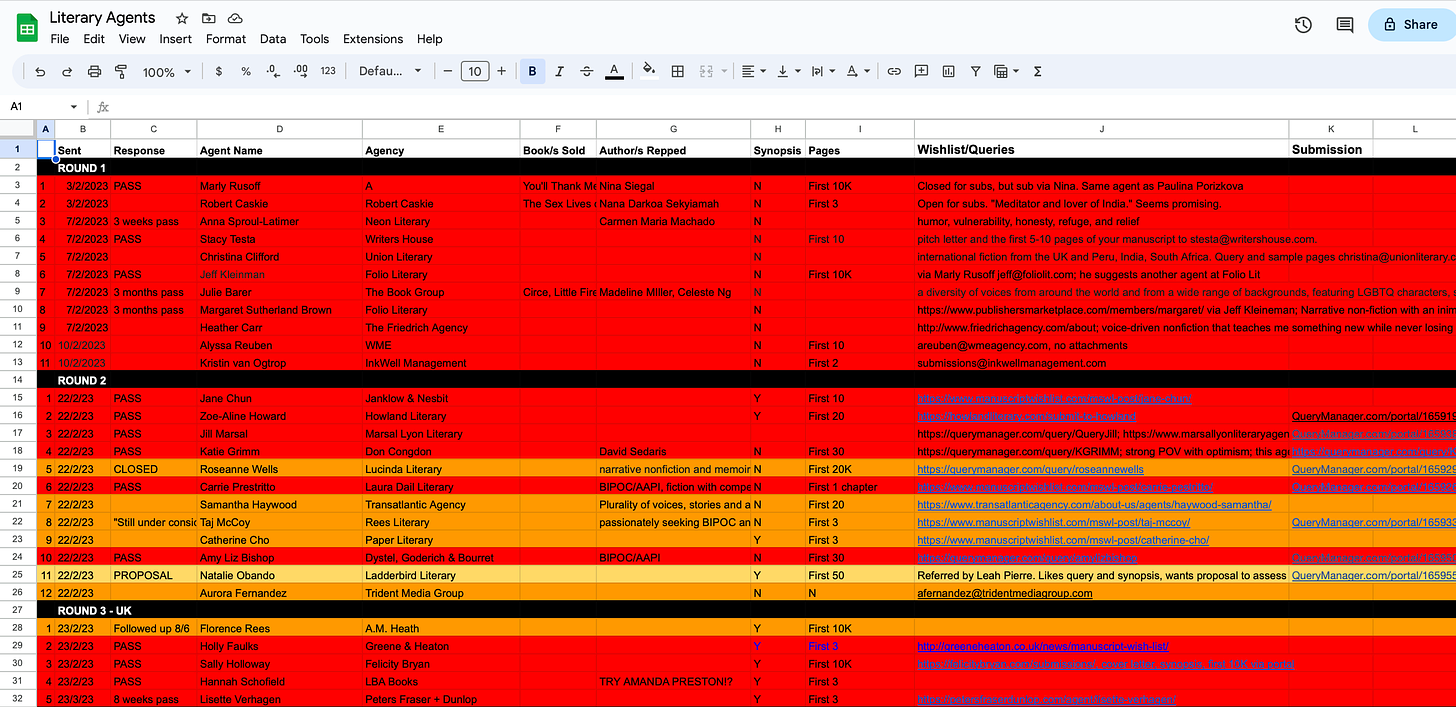
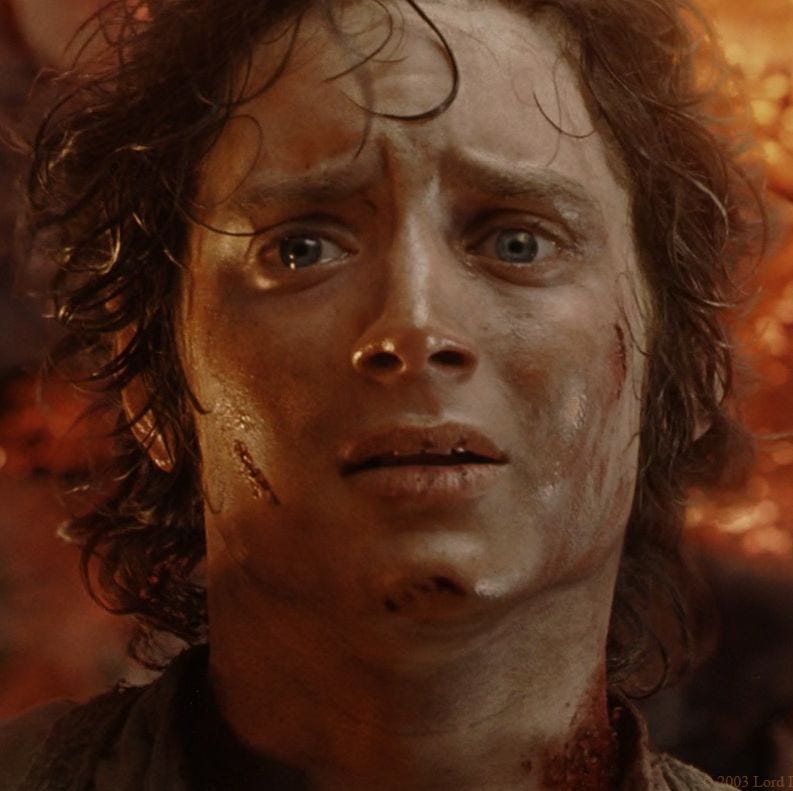
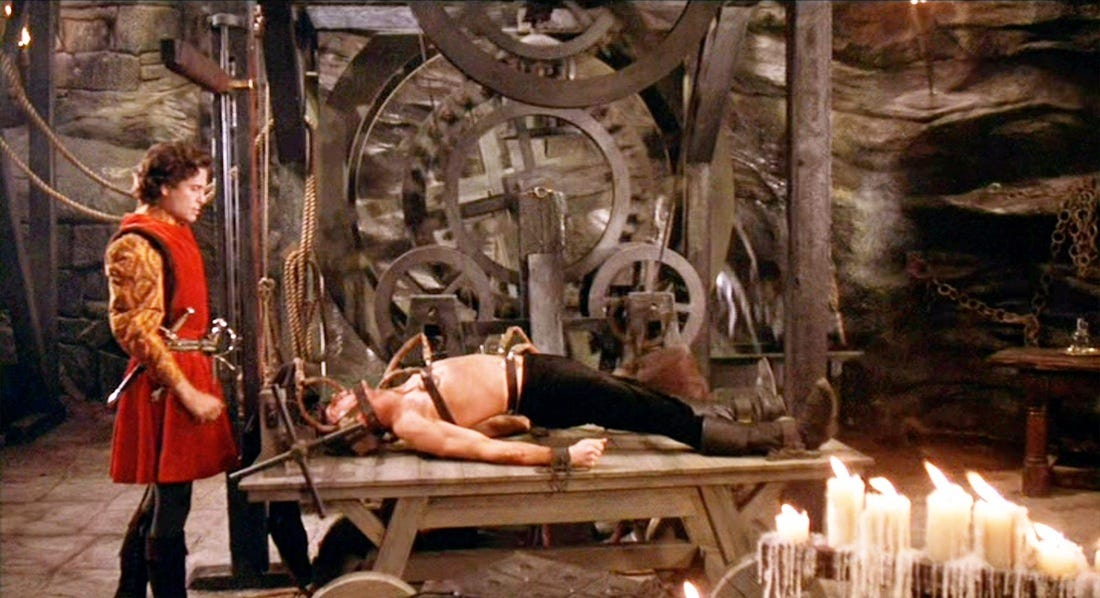




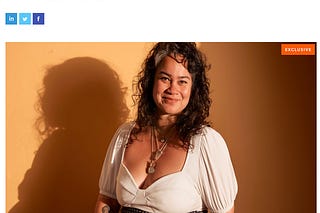
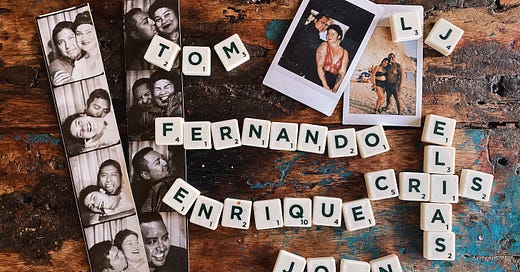

Thank you for sharing this experience. I was just in a Zoom writing room talking about my experience to date of querying. And someone shared this essay. Everything you mentioned I'm experiencing in real time. The thing that disturbs me most is knowing that part of me is seeking that validation from someone outside myself that my work is worthy of publication. I must reframe that to remember that I'm seeking a partner to champion my work, not validate me as a human being. The mental gymnastics of attempting to address each agent's peccadilloes is nuts! But your words are helping me to march forward.
What an incredible story! I thank you for sharing it in such detail. I'm working on a book proposal and I learned a lot already from your experience, and plan to follow the links you provided. I'm grateful that you stuck it out, found success and are helping others by sharing your journey. And that you were called on today in LWS Writers' Hour!